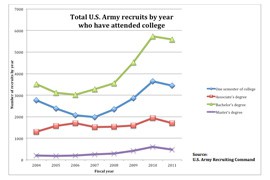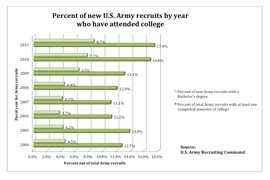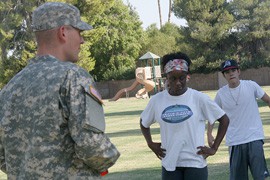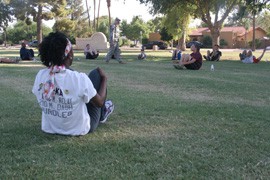Cronkite News has moved to a new home at cronkitenews.azpbs.org. Use this site to search archives from 2011 to May 2015. You can search the new site for current stories.
In weak economy, more college graduates enter the military
GOODYEAR – Hammering out push-ups and squats at a public park, Andrea Bloom and Kandice Talley are enduring the heat – and ant bites – like the rest of the new Army recruits taking part in an informal workout.
Unlike the other enlistees, however, Talley has a bachelor’s degree in community health and Bloom a bachelor’s in journalism.
After graduation, Bloom worked briefly as a newspaper photographer and then as a server at a restaurant. Over time, she grew tired of struggling to find a decent job and decided to go back to school.
Instead of taking out student loans, she joined the Army, where she will train to be a medic and then use the G.I. Bill to study medicine.
“There are perks such as health care which play a role,” Bloom said. “But the main incentive was the actual job.”
Education benefits also attracted Talley, who works as a group home manager but will manage supplies as an Army logistics specialist. When her enlistment is up, she plans to study nursing.
“I want to be able to go back to school so I can get a job and be guaranteed a job,” she said.
According to numbers released by the U.S. Army Recruiting Command, Talley and Bloom aren’t alone. In the weakened economy, more college graduates are signing up as enlisted personnel. College degrees are normally associated with officers.
Nearly 6,000 recruits with bachelor’s degrees enlisted in the Army last year, a 57 percent increase from 2008.
As a percentage of overall Army recruits, those with bachelor’s degrees constituted 8.7 percent last year, up from 4.5 percent in 2004.
The recession has been especially hard on young people, according to the nonprofit Generation Opportunity, which reported the unemployment rate for 18-29 year-olds at 12.7 percent in August.
These types of extreme economic factors lead to a more educated pool of military recruits, said Beth Asch, a military researcher for the Rand Corp.
“There certainly is and has been a connection between the economy and military recruitment,” Asch said, “especially when it’s in the tank like it is today.”
Military retention is high right now, Asch said, because people want to join and people want to stay.
“Also there’s downsizing due to Iraq and Afghanistan winding down,” she said.
The recession isn’t the only reason for the increase in enlistees with college degrees but certainly plays a role, said Army Sgt. Andrew Thatcher, a recruiter in Glendale. He’s seen a rise in college graduates but even more of an increase in those who’ve started college and have yet to finish.
“People are realizing that maybe college isn’t the answer to everything,” Thatcher said, “and they’re coming here to get a start on life.”
When he started recruiting eight years ago people came in for the bonuses and incentive programs, but those aren’t being handed out as readily these days, Thatcher said.
“Now it’s more about getting a career, getting trained and getting a marketable skill,” he said.
Bloom said the opportunities overshadow any doubts or fears about the politics or dangers of being a soldier.
“You just kind of set that aside,” she said. “It’s about bettering yourself.”
Thinking about the positive also helps Talley overcome the fear of being in harm’s way.
“I like helping people, so I feel like I’m helping the country,” she said.










